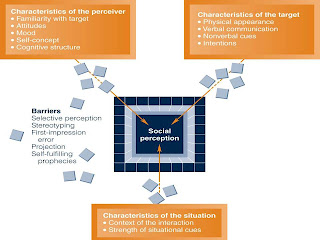what is PERSONALITY?
The complex of all the attributes--behavioral, temperamental, emotional and mental--that characterize a unique individual; "their different reactions reflected their very different personalities"
TRAIT THEORY
The big five personality traits…
| Extraversion | The person is gregarious, assertive, and sociable (as opposed to reserved, timid, and quiet) |
| Agreeableness | The person is cooperative, warm, and agreeable (rather than cold, disagreeable, and antagonistic) |
| Conscientiousness | The person is hard working, organized, and dependable (as opposed to lazy, disorganized, and unreliable) |
| Emotional stability | The person is calm, self-confident, and cool (as opposed to insecure, anxious, and depressed) |
| Openness to experience | The person is creative, curious, and cultured (rather than practical with narrow interests) |
Personality Characteristics in Organizations
•Core self-evaluation (CSE): basic conclusions or bottom-line evaluations that individuals hold about themselves. It comprises the following aspects:
· Locus of control
· Self-esteem
· Generalized self-efficacy
· Emotional stability
•Self-monitoring: theory that deals with the phenomena of expressive controls
•Affect (positive, negative)
Myers-Briggs Type Indicator (MBTI) Instrument
•An instrument developed to measure Carl Jung’s theory of individual differences.
Social perception: Process of interpreting information about another person
Factors that influence our perception of another person:
· Characteristics of ourselves, as perceivers
· Characteristics of the target person we are perceiving
· Characteristics of the situation in which the interaction takes place
Barriers to Social Perception
1. Selective perception
2. Stereotyping
3. First-impression error
4. Projection: “the false-consensus effect”
5. Self-fulfilling prophecies
Attribution Theory: explains how individuals pinpoint the causes of their own behavior and that of others.
o Internal attribution (something within one’s control)
o External attribution (something outside one’s control)
Attitude: A psychological tendency expressed by evaluating an entity with some degree of favor or disfavor
ABC Model of an Attitude…
| Component | Measure by | Example |
| Affect | Physiological indicators Verbal statements about feelings | “I do not like my boss” |
| Behavioral intentions | Observed behavior Verbal statements about feelings | “I want to transfer to another department” |
| Cognition | Attitude Scales Verbal statements about feelings | “I believe my boss plays favorite” |
Work Attitudes:
· Job Satisfaction: pleasurable or positive emotional state resulting from the appraisal of one’s job or job experiences.
· Organizational Commitment: strength of an individual’s identification with an organization. It consists of:
1. Affective commitment
2. Continuance commitment
3. Normative commitment
TYPES OF COMMITMENT:
· aFFECTIVE COMMITMENT: an employee’s intention to remain in an organization because of a strong desire to do so.
· continuance commitment: an employee’s tendency to remain in an organization because he or she cannot afford to leave.
· normative commitment: a perceived obligation to remain with the organization.
values: Enduring beliefs that a specific mode of conduct or end state of existence is personally or socially preferable to an opposite or converse mode of conduct or end state of existence.
· Work Values: Achievement, Concern for others, Honesty, Fairness.
REFERENCES:
· Document from university of Iowa:
QUESTION
Using the ABC model of an attitude, analyze what Yasuko´s comments about JICA reveal about her attitudes
Taking into account the ABC model, Yasuko expressed to have an attitude with a good affect for JICA, her good face while talking about her job and her important labor in this foreign country shows a very good affect for what he has chosen to do. Her behavioral intention seems to be accord with her social labor, showing her deep desire to help Colombian people through JICA’s mission. And finally in the cognition I perceived that she really believe that what she is doing is exactly what she wanted and she is in the right place to do the beautiful and important task that JICA entrusted her.


No hay comentarios:
Publicar un comentario